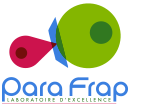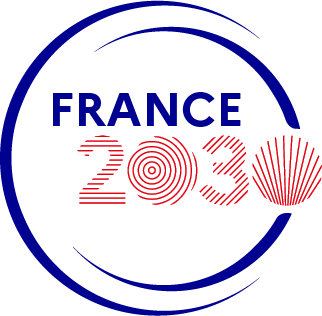

Coordinators : Stéphanie Blandin, Cyrille Botté, Elisabeth Davioud-Charvet
Participants : Bastien, Bringaud, Delauw, Davioud-Charvet, Hakimi, Langsley, Lebrun, Mazier, Scherf
This WP will pave the way for the development of novel therapeutic weapons to treat important human and animal infections such as Malaria, Toxoplasmosis, Tropical Theileriosis, Schistosomiasis, African sleeping sickness, Leishmaniasis and Chagas disease. It has strong translational components with industry partners.
1- Target validation as an 'upstream' approach to drug development
Description of work :
The goal is to focus on specific targets (with a preference for regulatory/limiting steps) and to bring together structural biologists/biochemists with chemists from academia and the pharmaceutical industry.
Deliverables :
D1. Characterisation of a new pathway called "acetate shuttle" and of NADPH-producing enzymes that are crucial to detoxify free radicals in human trypanosomatids; expression of key enzymes for HTS to develop inhibitors of T. brucei development (Bringaud).
D2. Characterization of further regulatory critical key steps of phospholipid synthesis pathways in Plasmodium and 3D structures of enzymes-substrates for rational design or in silico screening to identify new scaffolds by computer-aided molecular design (Vial); Use of photoaffinity labelling for identification of the reduction site of antimalarial naphthoquinones in glutathione reductase (Davioud-Charvet).
D3. Characterization of the 'prokaryotic-type' proteasome of trypanosomatids and development of molecules mimicking the C-terminus of one subunit as selective inhibitors (Bastien)
2- Development of versatile chemistry for new antiparasitic drugs
The goal is to bring new drug candidates at the development stage that can be further enlarged on clinical trials in association with pharmaceutical groups (licence transfer).
Description of work :
The description of pharmacological strategies against validated targets described in deliverables is self- explanatory. The therapeutic profile of compounds will be evaluated in vitro and in vivo and will also be worked out by techniques of high prognostic value in respect to drug safety. The most promising compounds will be tested in established infection models and in the most predictive models for preclinical and clinical development.
Deliverables :
D1. Dedicated synthetic strategies applied to lead inhibitors and HTS against histone deacetylases and methyl transferase enzymes that play crucial roles in cell chromatin structure and epigenetic gene expression, whose inhibition opens new perspectives for curing malaria at all stages and for curing both the latent and resistant stages of toxoplasmosis and likely other apicomplexan parasites (Scherf, Mazier, Hakimi, Davioud-Charvet).
D2. Engineering of compounds (by HTS of chemical libraries) interfering with AMA1-RON2 complex that forms the core machinery of the moving junction driving invasion of apicomplexa parasites (Lebrun).
D3. The challenge for successful drug development includes capacity to assess their therapeutic utility against all malaria species and stages. A discovery programme for novel compounds against liver stages of malaria parasites including hypnozoites in under way (Mazier).
D4. Development of specific protease inhibitors counteracting the principal pathogenic effect of the kinetoplastids useable for treatment of Animal African Trypanosomosis (AAT); in vivo validation using natural West African cattle (Cuny)
D5. Total synthesis and optimization of antiparasitic 1, 4-naphthoquinones and discovery of novel redox- active series depleting NADPH flux to extend the concept and 1,4-naphthoquinones in malaria and trypanosomatidae parasites (Davioud-Charvet, Bringaud).
D6. Production of selected recombinant parasite DYRKs/CLKs kinases, identification and selection of orthologues parasite-selective protein kinases inhibitors and human versus parasite structure-based inhibitor design (Meijer, Scherf, Vial).
3- New vaccine strategies and design of sensitive diagnostic tools
Description of work :
Vaccine approaches are the most challenging approaches to control parasitic diseases. ParaFrap's strengths in this field as well as in biomarkers are particularly promising against leishmaniasis, animal trypanosomiasis and tropical theileriosis, which are important neglected and uncontrolled parasitic diseases.
Deliverables :
D1. Based on the minimum peptide sequences bearing immunodominant epitope, Lemesre's team will design and develop a human-compatible vaccine candidate targeting most, if not all, Leishmania species that cause the most severe forms of leishmaniasis. Establishment of procedures and methods for the subsequent clinical trials (Lemesre/Cuny).
D2. Based on the use of sialidases and trans-sialidases (validated in T. congolense, as "anti-disease" antigens), Baltz team will design a multicomponent vaccine for the development of a Trypanosomosis andidate vaccine and penside diagnostic tests for AAT that is the most important animal disease on the African continent (Baltz, CEVA).
D3. Langsley's team proposes to develop the first attenuated vaccine to tropical theileriosis via engineered functional inactivation of a host cell transcription factor (AP-1) that they have shown to mediate Theileria-dependent host cell metastasis." The protective potential of this engineered vaccine will be tested by experimental infection of calves by Prof Mohamed Darghouth, Director of the National VetSchool in Tunisia (Langsley/Darghouth).
D4. Based on cathepsin B validated as an excellent biomarker tool for AAT, development of molecular markers to get a decision-making aid for the diagnosis of AAT infections (Baltz). The Cuny lab should deliver molecular markers to get a decision-making aid for the diagnosis of T. brucei gambiense infections and for staging of sleeping sickness. Another strength in this field comes from the Delauw team that has developed a recombinant GRA antigens-based ELISA test reliable to diagnose acute toxoplasmosis. Another project aims at establishing a test based on the GRA circulating antigens in the prognosis of toxoplasmosis (Cuny, Delauw).
4- Translational research & development and marketing
i) Vaxileish lead by Virbac has provided Canileish®, an efficient vaccine in dogs against leishmaniasis (European registration March 2011)
ii) InnoMad lead by Sanofi- aventis and Horiba-Medical (2009-2012- Innovative anti Malaria therapies and Diagnostic), is providing promising results for both treatment and diagnostic of malaria. The Biotech ManRos Therapeutics, "from Sea to Pharmacy", generating new pharmacological inhibitors of key disease-relevant kinases, created by L. Meijer and H. Galons, is partner of the ParaFrap LabEx (co- labeled by Pole Mer Bretagne and EuroBioMed) (already employing 4 to 5 chemists). It is supported by another FUI program. - Specific actions will be conducted to increase the connections of the ParaFrap with the Health-related "pôle de compétivité" (especially Eurobiomed, Lyon BioPole, Alsace Biovalley Innovations, Medicen) and the local/national structures supporting the creation of new innovative start-ups (OSEO).
Gordon Research Conference 2026 – Biology of Host–Parasite Interactions The 2026 Gordon Research Conference (GRC) on Biology of Host–Parasite Interactions will take place June 7–12, 2026, at Salve Regina University, in...
The INSERM workshop “Modern methods in molecular parasitology” will take place in Montpellier, France, from 4–6 November 2026. This event will bring together leading experts in...
The 15th CAPF (French Anti-Parasitic and Anti-Fungal Consortium) workshop will take place on 16–17 March 2026 in Strasbourg (France). This event is an excellent opportunity for students and postdoctoral researchers to participate and contribute...
Call for Applications: New Junior Research Groups at Institut Pasteur The Institut Pasteur has launched an international call to recruit new junior group leaders.This is a unique opportunity for high-potential scientists to...
JOB : Ingénieur·e d’étude / Research Engineer – Mosquito Immunity (IBMC, Strasbourg) 🇫🇷 Le laboratoire Mosquito Immune Responses recrute un·e ingénieur·e d’étude à l’IBMC (Strasbourg). La personne recrutée sera en...
Applications are now open for the 2026 Biology of Parasitism (BoP) course, taking place June 12–July 23, 2026 at the Marine Biological Laboratory in Woods Hole, MA.This intensive 6-week program offers PhD students and postdocs advanced training in...
Newcastle University offers a full-time, fixed-term position (3 years) for a Research Assistant or Research Associate in Molecular Parasitology — funded by the Medical Research Council (MRC). About the Opportunity Location:...
Multidisciplinary PhD opportunity in the fields of infectious diseases, gene regulations and molecular signalisation. Fully Funded 4-Year PhD at the University of York A fully funded PhD opportunity is available at the...
The EMBO Workshop 2025 “Host–Parasite Relationship: From Mechanisms to Control Strategies”, took place from October 5–8, 2025, on the beautiful Île des Embiez (France). Organized within the framework of the LabEx ParaFrap and...
Postdoc (M/F) in molecular and biochemical parasitology (Toxoplasma gondii) A 24-month post-doctoral position starting on January 2026 and funded by the French National Research Agency (ANR) is available in the in the...

© 2023. All rights reserved MLCOM
Notre site LabEx ParaFrap utilise des cookies pour réaliser des statistiques de visites, partager des contenus sur les réseaux sociaux et améliorer votre expérience. En refusant les cookies, certains services seront amenés à ne pas fonctionner correctement. Nous conservons votre choix pendant 30 jours. Vous pouvez changer d'avis en cliquant sur le bouton 'Cookies' en bas à gauche de chaque page de notre site. En savoir plus
Ce site utilise des cookies pour assurer son bon fonctionnement et ne peuvent pas être désactivés de nos systèmes. Nous ne les utilisons pas à des fins publicitaires. Si ces cookies sont bloqués, certaines parties du site ne pourront pas fonctionner.
Ce site utilise des cookies de mesure et d’analyse d’audience, tels que Google Analytics et Google Ads, afin d’évaluer et d’améliorer notre site internet.
Ce site utilise des composants tiers, tels que NotAllowedScript699eab4cdc7edReCAPTCHA, Google NotAllowedScript699eab4cdc440Maps, MailChimp ou Calameo, qui peuvent déposer des cookies sur votre machine. Si vous décider de bloquer un composant, le contenu ne s’affichera pas
Des plug-ins de réseaux sociaux et de vidéos, qui exploitent des cookies, sont présents sur ce site web. Ils permettent d’améliorer la convivialité et la promotion du site grâce à différentes interactions sociales.
Ce site web utilise un certain nombre de cookies pour gérer, par exemple, les sessions utilisateurs.

